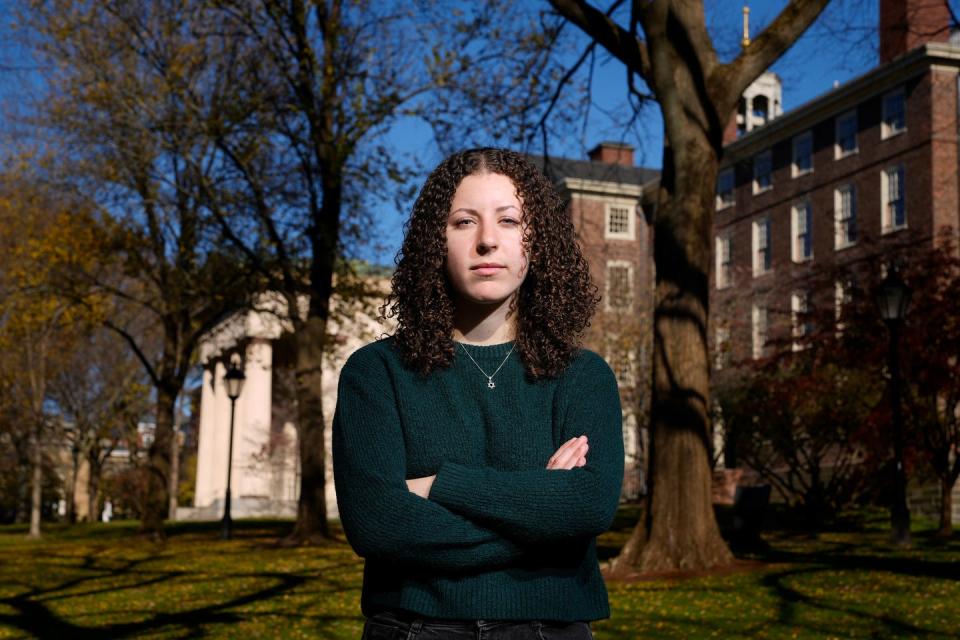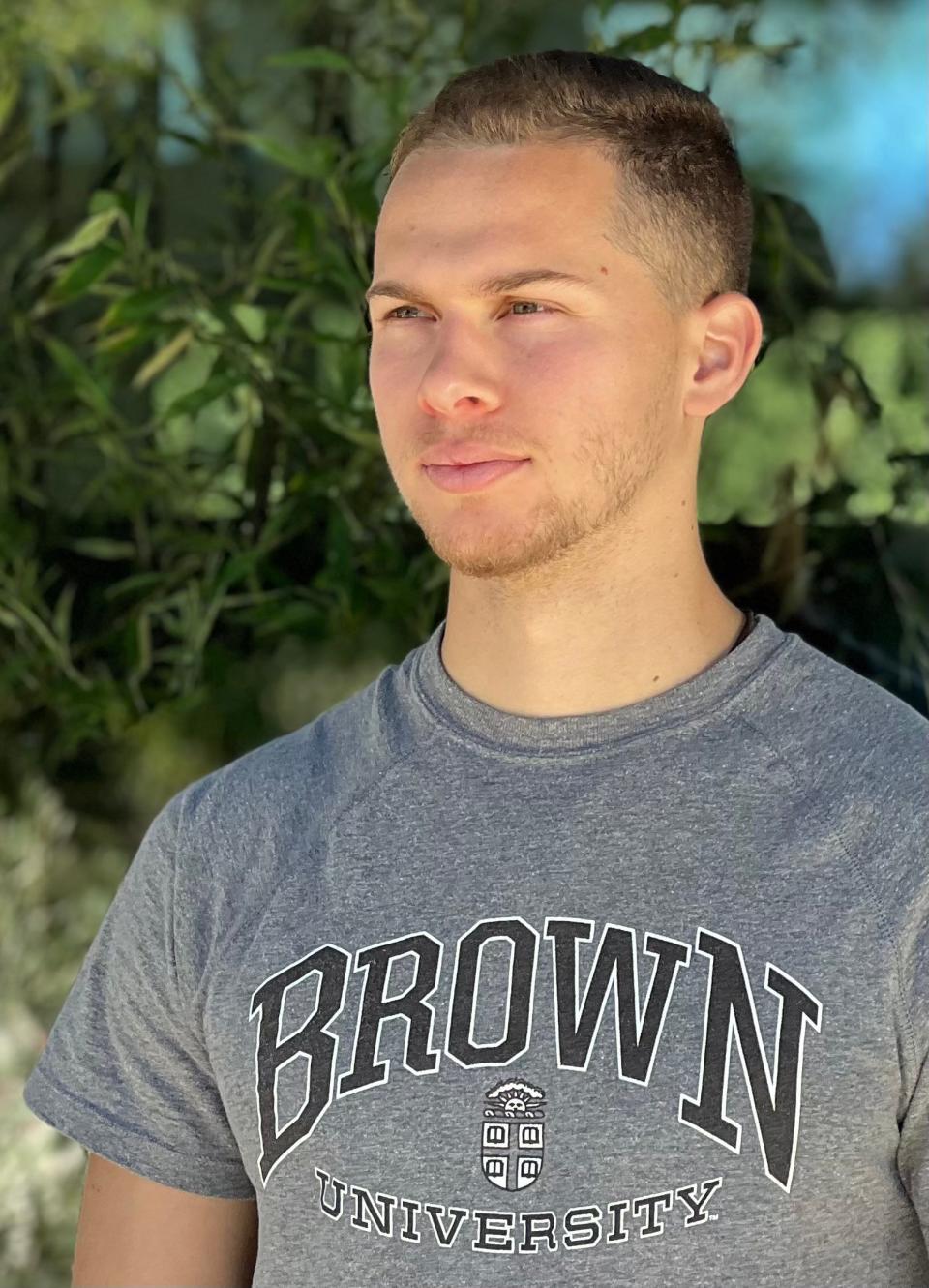After talking to these students, Mark Patinkin says Brown has an antisemitism problem
There’s been a lot of publicity about 20 Jewish Brown University students arrested Nov. 8 after a campus sit-in demanding school divestment from Israel and a cease-fire in Gaza. It left an impression most Jewish students there are pro-Palestinian.
Similarly, there’s a sense that Brown doesn’t have the kind of antisemitism issues rampant at other Ivy schools like Cornell, Penn and Harvard. There have been few if any mainstream articles about a problem at Brown.
Indeed, that sit-in group, “BrownU Jews for Ceasefire Now,” said in an open letter: “We do not feel threatened by pro-Palestine advocacy on College Hill.”
But one of the most prominent Jewish student leaders on campus tells a different story.
Her name is Jillian Lederman, 20, president of Brown Students for Israel and chair of Hillel International's Israel Leadership Network, a group of students from 150 campuses.
She told me the arrested students do not represent most Jews on Brown’s campus. And that the school indeed has an antisemitism problem with posters of Israeli hostages being ripped down, campus rallies with cries of “Glory to our martyrs” and Jewish students ostracized online and told in person they’re supporting genocide.

It’s gotten so bad that Jillian, as well as female Jewish friends of hers, have begun to carry pepper spray, with some of their parents being worried enough to at times suggest they come home.
On Nov. 15, Jillian and three fellow students decided to publish an open letter in the Brown Daily Herald as a voice for those on campus who are pro-Israel.
“We are scared,” the letter stated, citing the ripped-down posters and chants of “From the river to the sea,” and “the resistance lives,” at Brown protests – clearly celebrations of Hamas.
The letter continued: “On campus chat platforms, we have seen calls for Israeli Jews to ‘go back to Europe’ and claims that ‘there is no such thing as an innocent Israeli.’ How can we feel welcome on campus when we see our people so despised?”
The letter, which supported Israel’s war against Hamas, was co-authored by fellow seniors Ben Piekarz, Theodore Horowitz and Rachel Blumenstein, and so far, through platforms like Facebook, it has gotten almost 1,000 signatories, many of them alums, but including nearly 200 Jewish students.
Jillian says this contrasts with the much lower number – dozens of signatories – on the public statement by the Jewish students arrested in the sit-in.
“They do not represent us,” Jillian’s letter said emphatically in italics.
And she told me: “There was frustration about them taking on the mantle for the Jewish community at Brown.”
Another reason she and the others issued a public statement is that since Oct. 7, pro-Palestinian voices have dominated Brown, including open letters signed by hundreds of Brown faculty calling both for a cease-fire and the trespassing charges to be dropped against the 20 pro-divestment Jewish students arrested at the campus sit-in.
Jillian and her three co-authors completed their own letter on an overnight bus ride with fellow Brown students to the Nov. 14 “March for Israel” in Washington.
They hoped it would advance understanding, but instead it drew an immediate backlash. Jillian said that soon after, a campus messaging site called Sidechat filled with people attacking them. Normally, Jillian said, Sidechat is a collegial space where students talk anonymously about campus life, but now, posts said anyone who signed the pro-Israel open letter supports genocide.
Other comments, Jillian felt, were antisemitic dog whistles, like one saying, “Students who write Zionist op-eds are all top one percent wealthy white kids with internships at Goldman Sachs.”
The attacks got so bad some of Jillian’s Jewish friends asked, out of fear, that their signatures be removed from the letter.
Ben Piekarz, 21, a co-author of the letter, told me that even before it was published, many Jewish students were afraid to sign. In part, they were unsettled by strident pro-Palestinian voices at Brown, but another reason was the campus conversation around the arrested Jewish students.

“They were given an immense platform,” Ben said, “and glorified as if to say pro-Israel views are invalid here.”
He told me that most Jewish students on campus do support Israel – those at the well-publicized sit-in, which drew national coverage, are what Ben calls a “small subset.”
But he told me many pro-Israel students feel afraid to speak about it. To explain why, he sent me a screenshot of one of the Sidechat attacks.
“Genuinely believe that Zionists at Brown do not see non-Jews as human beings,” it said. “They’re literally an ethnic cult who will kill children and then claim they are the victim.”
Such posts, he said, ingrain stereotypes and intimidate Jewish students into silence.
Jillian has seen similar remarks, including one reposting a photo of Brown students at the Washington March for Israel, with a link to similar photos including Jillian.
“Shame, shame, shame Brown students,” it said. “Free Palestine.”
Jillian has experienced unpleasant face-to-face encounters as well. At a recent off-campus party, two male students recognized her from an interview she’d done on CNN a week after the Oct. 7 massacre in her role as chair of Hillel’s Israel Leadership Network.
“So you support genocide,” one of the two males said to her.
She told them she preferred not to talk about it at the party, but they kept pressing until some friends of hers intervened, and they moved away together.
“Ever since then,” Jillian said, “every time I walk into a party, I wonder if someone’s going to be hostile.”
Another example: A Jewish student she knows who wears a kippah on his head was walking near his dorm when two students, male and female, came up behind him. The female yelled, “Free Palestine,” and “From the river to the sea.” Jillian's friend waved the kippah at them and walked on.
Such encounters are among the reasons Jillian now carries pepper spray, and hears of parents at times asking their kids if they feel they should come home.
Ben understands that. When an ex-Hamas leader called for a “global day of rage” on Oct. 13, he and other Jewish students he knew steered clear of having Shabbat dinner that night at Hillel, worried it could be a target given the anti-Israel attitude on campus.
After feeling no antisemitism during her first three years at Brown, Jillian felt the mood swing aggressively pro-Palestinian right after the Oct. 7 massacre of Jews. On Oct. 11, Brown’s Students for Justice in Palestine (SJP) put out a statement saying, “We hold the Israeli regime unequivocally responsible for all suffering and loss of life.”
That astonishing statement, blaming Jews for being massacred, was endorsed by 45 Brown student groups, including the Teaching Assistant Labor Organization, the Black Student Union, Latinx Student Union and Brown Democratic Socialists of America.
Despite this avalanche of pro-Palestinian campus sentiment, the Nov. 7 Brown faculty letter calling for a cease-fire and signed by hundreds also asked the administration, of all things, to protect the right to speak for the Palestinian cause without intimidation. The letter demanded the freedom to raise Pro-Palestinian points “loudly” on campus but did not say the same about voices for Israel.
Jillian finds that both ironic and unsettling, since pro-Israel speech is far more under attack at Brown.
Not long after the Oct. 7 massacre, Jillian and others at “Brown Students for Israel” started putting up posters of the 240 kidnapped by Hamas. The next day, they noticed some were torn down. Jillian said it’s Brown policy to take down any poster after a week or so, but most of these were ripped free within a day or two.
At one point, as Jillian watched a pro-Palestinian rally on the central green, she saw students moving to take some of the “Kidnapped” posters down. When Jillian and others told them, “Please don’t touch those,” the students put up their own flyers saying, “Resist Israeli propaganda. Free Palestine.”
Jillian still puts posters up but knows they won’t last long.
“Every single time,” she said, “they’ve been torn down.”
Last year, an antisemitic note was left at Brown-RISD Hillel misspelling the phrase “Hail Hitler,” and saying, among other things, “Gas the Jews and hope you die.”
Police later arrested a non-Brown person, but interestingly, even before that, Jillian decided it was a rogue event by a nut.
By contrast, she says the antisemitism in Brown’s pro-Palestinian campus atmosphere is worse because every day, there’s a specific message to Jewish students that if you stand with Israel, you’re an immoral oppressor.
“Things have been framed that students who are Zionist, or even Jewish, are on the wrong side of history,” Jillian said.
More Patinkin: State House rally for Palestine calls for justice – why no condemnation of Hamas?
She told me it has harmed and even split up friendships.
“I know people who have been ostracized by their friend groups by being in any way pro-Israel,” she said.
“They hear things like, ‘I can’t believe you support genocide. I can’t talk to you given I know you support Israel.’”
I asked Ben if Jewish students he knows have faced the same.
“Oh, for sure,” he said.
At one point, he even saw a post on Sidechat telling people to look up the names of students who signed the pro-Israel open letter.
“Go see who you need to block and unfriend,” said the post.
I reached out to Brown, which sent me a long, predictable statement that could be summed up in this sentence: “We are deeply committed to ensuring that Brown is safe and welcoming for all members of our community.” The statement said there’s a steering group of almost 40 charged to ensure all on campus are “receiving the care and support they need.”
But Jillian says most pro-Israeli Jewish students she knows feel under siege, and that the administration has been AWOL.
More Patinkin: His parents survived the Holocaust, now this RIer watches as a friend is attacked in Israel
“At the least,” she said, “harassment should be condemned and disciplined.” By that, she means specific cases, not bland general statements. “I can’t imagine comparable actions committed on any other group on campus being tolerated in this way.”
Jillian said she knows that antisemitism is worse at many schools, and she gives Brown a bit of credit for that.
“But what’s happening here right now is awful and shocking,” she said.
I asked Jillian if this has changed her view of Brown.
“I love Brown,” she said. “I’ve been so happy here. But I don’t think I’ll be able to remember this school separate from what I’ve experienced on campus over the last six weeks.”
Given the anti-Israel climate at Brown, I made sure both Jillian and Ben were comfortable with me quoting them.
They said they were.
“It’s important,” said Ben, “to show people out there that this is going on.”
And Jillian said she doesn’t want to let the intimidation silence her.
But both agreed that is exactly what has happened to many Jewish students at Brown University.
mpatinki@providencejournal.com
This article originally appeared on The Providence Journal: Brown University student actions display antisemitism problem: Patinkin

